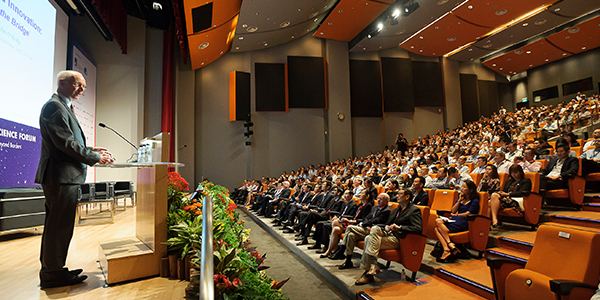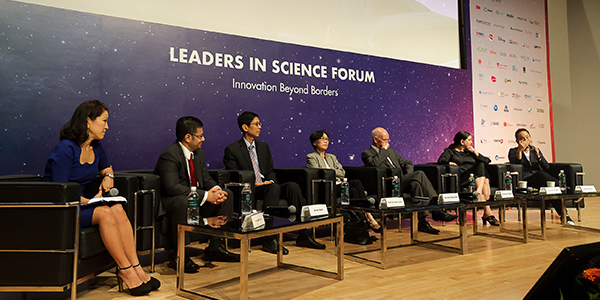INNOVATE
Bridging the Innovation Gap
Although Singapore is recognized as one of Asia’s most innovative economies- local enterprises and start-ups continue to face challenges scaling up and expanding globally. At the recent Leaders in Science Forum – organised as part of the one-north Festival- a four-day celebration of research- innovation- creativity and enterprise – industry leaders shared what might be driving this phenomenon and what more can be done to tackle it.
ONF Leaders in Science Forum 2017 Video:
Long-term view from lab to market
One of the issues pointed out by Nick Nash- Group President of e-commerce firm Sea- is that start-ups have a tendency to latch onto technology bandwagons.
“This is a worrying trend- because start-ups that try to replicate technology trends don’t usually last.”
He was referring to nearly 200 Groupon-lookalike start-ups that were set up between 2010 to 2012- and over 100 e-commerce and direct selling inventory businesses that were established between 2012 to 2015. Many of which had since been sold or closed down.
The panellists also discussed the need for innovators to take a long-term view when going from research to market.
Professor Sir John O’Reilly- Chairman of A*STAR Science and Engineering Research (SERC) Council and ERA Foundation Ltd- noticed that start-ups tend to over-focus on their exit strategy even before they are formed. This preoccupation with an exit prevents founders from focusing on the long-term development of their start-ups- which is often an important criterion for a company’s continued success.
Fellow panellist- Ong Tze Boon- the Group Executive Chairman of architectural firm Ong & Ong- agreed.
“It’s wise for start-ups to be concerned over money. However- money should not be the main driver behind innovation. Start-ups that do what they do well will profit from their efforts.”
Value of R&D investment

Another topic that was discussed was about the return on investment for research spending.
A recently published opinion piece in The Straits Times- a local daily- pointed out that academic and publicly-funded research only accounted for 9% of all products and services in the U.S. This raises questions over the viability of R&D spending in Singapore.
Professor Tan Chorh Chuan- President of the National University of Singapore (NUS)- clarified otherwise.
“A lot of products in use today are the result of publicly-funded research done many years ago – some research was from 30 to 50 years prior.”
“Even in the U.S- the funding preceded the finished product. This is especially so for industries with long gestational periods like life sciences-” he said.
Encourage experimentation beyond technology
Professor Chan Heng Chee- Ambassador-at-Large with the Singapore Foreign Ministry and Chairman of the Lee Kuan Yew Centre for Innovation Cities at Singapore University of Technology and Design- believes that Singapore’s “scolding culture” might be hindering innovative thinking.
“Children in Singapore are often not encouraged to debate with their parents. When they grow up- they may be reluctant to question the status quo – and questioning the status quo is a necessary mind set for innovation.”
Ong added that innovation should not be thought of as merely technological- but in a more holistic manner. “Innovation is not just about technology. There’s a whole area of behavioural science behind it. For instance- when we build condominiums- we need to question ourselves if we are building communities-” he said.
Rethinking how budding start-ups can grow

Nash pointed out that while founders in Singapore possess good ideas- many are lacking the ability to translate ideas into actual businesses – what Nick referred to as “business-model innovation”.
This is what the “venture co-creation” initiative – as mentioned by Finance Minister Heng Swee Keat during his keynote speech at this forum – sets out to address.
Under this initiative- A*STAR’s commercialisation arm ETPL works closely with private venture co-creators to conduct market research- identify viable business opportunities and markets- and connect with potential investors. All these could be simultaneously conducted- even before founder(s) are identified or companies are formed.
There is greater speed to market- as start-ups could tap on A*STAR’s suite of IP licenses and expertise to strengthen their technological capability. At the same time- start-ups would also benefit from the venture co-creators’ access to capital- markets and entrepreneur talent.
Finance Minister Heng Swee Keat also urged public and private institutes to co-create solutions that not only meet their strategic needs- but also develop the potential for these solutions to be exported overseas. One way in which this is achieved will be through the Global Innovation Alliance (GIA)- which was set up to deepen partnerships between local enterprises and overseas business communities.
With initiatives like venture co-creation and GIA- the budding Singaporean start-up and local enterprise can now get a leg up from the different stakeholders that can affect its future growth.
Venture co-creation in action
As the founder of venture creation platform Startup-O- Anuj Jain found himself overwhelmed with the 150 WhatsApp conversations he was having with prospects at any given time.
To solve his problem- Jain collaborated with A*STAR’s Institute for Infocomm Research (I2R) and Institute of High Performance Computing (IHPC) to develop a bot powered by an advanced artificial intelligence (AI) domain. Known as ‘NegoBot’- the bot is programmed to chat and negotiate with multiple prospects using conversational language.
To refine the business case for NegoBot- Jain and his team gathered an audience at A*STAR’s Media Exploits forum to act as board members of a new venture. They voted through a website on key business decisions- such as market strategy- customer segment and sales cycles.
At the end of the session- the audience formed a new company. As a token of their involvement in the venture creation process- they each received a share in the company. Although NegoBot’s business case had been pre-planned by Jain and his team over the past six months- the real-time VCC process provided the audience a glimpse into the thought process that went into the new venture.
As one of the venture co-creators- Startup-O will continue to partner with A*STAR’s ETPL to help other Singaporean start-ups accelerate their time to market.
To find out how you can license our technologies or partner with A*STAR- email us at (tech-offer@accelerate.tech)
Was the article helpful?
A*STAR celebrates International Women's Day

From groundbreaking discoveries to cutting-edge research, our researchers are empowering the next generation of female science, technology, engineering and mathematics (STEM) leaders.
Get inspired by our #WomeninSTEM
